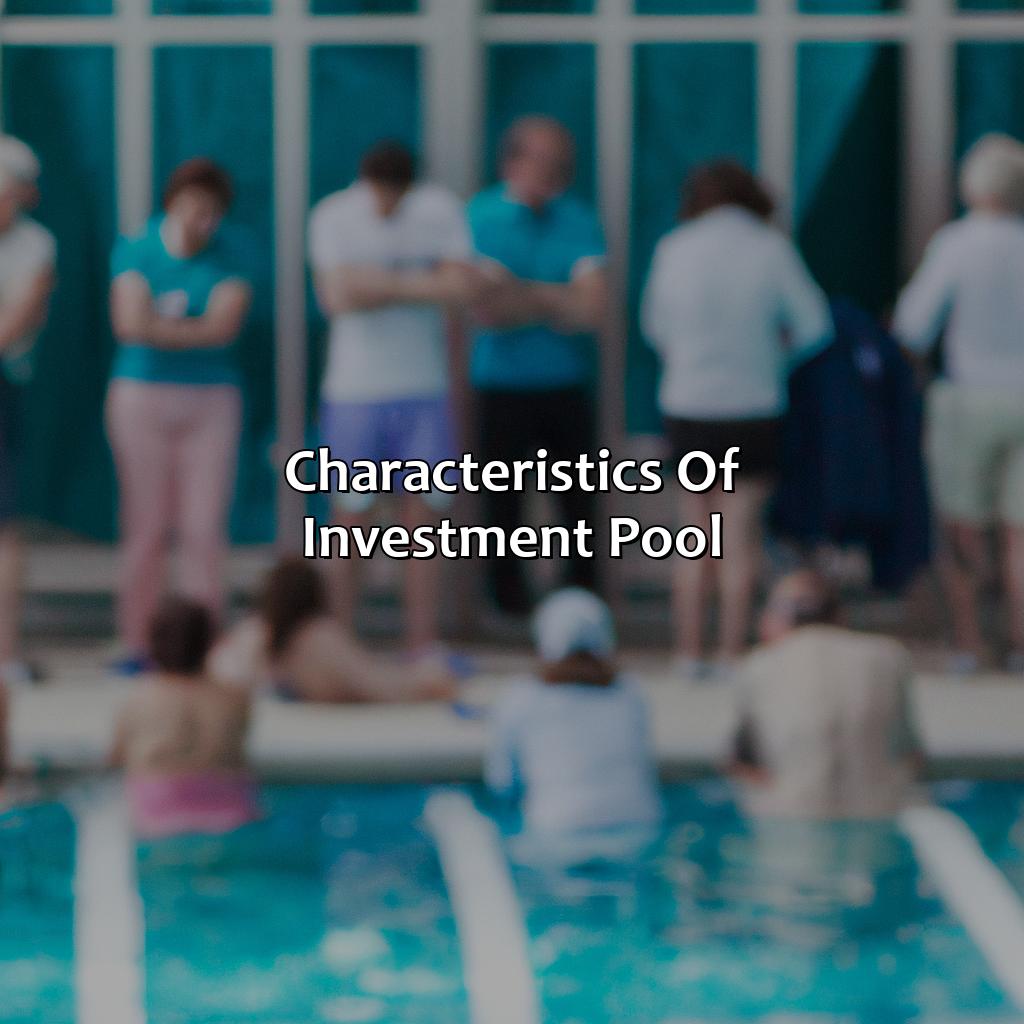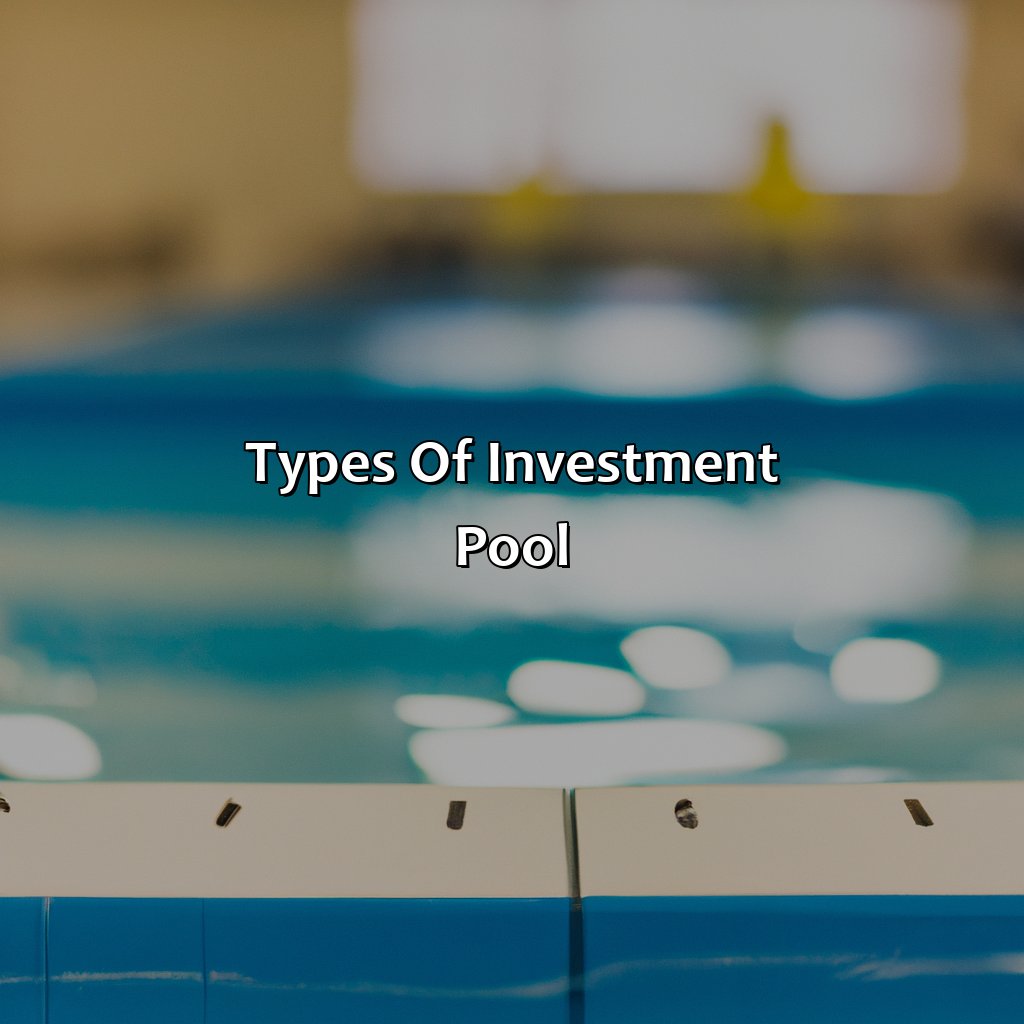What Is An Investment Pool?
Key Takeaway:
- Investment pools are a way for multiple investors to pool their resources together to make larger investments, providing access to opportunities and reducing individual risk.
- The characteristics of investment pools include pooling of funds, diversification of investments, and professional management, which can lead to reduced risk and economies of scale.
- Types of investment pools include mutual funds, hedge funds, and private equity funds, each with their unique structures, regulations, and risk profiles.
- Advantages of investment pools include reduced risk, access to professional management, and economies of scale, while disadvantages include lack of control and fees and expenses.
Have you ever wondered how large investments are made? Have you ever wanted to invest in the stock market, but don’t know where to start? Investment pools can provide a great way to get involved with the stock market. You can take advantage of the experience and collective knowledge of others and share in the potential gains and losses. Read on to learn more about what an investment pool is.
Characteristics of Investment Pool
Are you ready to learn about investment pools? They offer solutions like pooling of funds, diversification of investments, and professional management. Each part has its own unique role in how the pool operates. Let’s explore the key characteristics of an investment pool!

Image credits: retiregenz.com by Yuval Washington
Pooling of Funds
Pooling of funds occurs when multiple investors combine their financial resources to create an investment pool. The pooled funds are then managed by a professional fund manager, who invests the money in various assets based on the investment objectives of the pool.
The characteristics of an investment pool include:
- Diversification of investments
- Lower transaction costs
- Access to professional management services
- Potentially higher returns due to economies of scale
It’s worth noting that these investment pools can come in different forms such as hedge funds, mutual funds, and exchange-traded funds (ETFs). Each form has its unique structure and regulations that determine how it operates.
In the history of investment pools, one famous example is the South Sea Company in 18th century England. It was a government-endorsed company that promised huge returns on investments in trade with South America. Eventually, it became a bubble that caused investors to lose everything. This example highlights the importance of caution and proper research before investing in any pool or fund.
Why put all your eggs in one basket when you can put them in a pool?
Diversification of Investments
Investment Pool – The Art of Spreading the Wealth
One of the keys to successful investing is diversification. Investing in a single asset increases risk, while investing in multiple assets can reduce it. An Investment Pool is an excellent way to achieve this spread.
In an Investment Pool, funds from multiple investors are pooled together and then invested in a diverse range of assets such as stocks, bonds or real estate. This diversification strategy helps to minimize risk while maximizing returns.
In addition, Investment Pools provide access to otherwise unaffordable high-yield investment opportunities, making them attractive to individual investors who don’t have access to large capital.
Don’t miss out on potential investment opportunities! Consider Investing in an Investment Pool today and achieve significant returns with minimized risk.
Leave your investments in the hands of professionals, because let’s face it, they can’t do any worse than your ex.
Professional Management
Investment pools are managed by professionals, who use their expertise to maximize profits while minimizing risks. These professionals have a deep understanding of market trends and economic indicators, allowing them to make informed decisions on behalf of the investors. The professional management team ensures that the investment pool is well-diversified across different asset classes to minimize volatility and maximize returns.
The professional management team follows a disciplined investment approach that focuses on long-term capital appreciation. They regularly review the portfolio and adjust it as needed to ensure that it aligns with the investment objectives of the pool’s investors. This includes making strategic asset allocation decisions, selecting high-quality securities, evaluating risk factors, and monitoring performance.
One unique aspect of professional management is their ability to provide custom-tailored solutions for each investor’s needs. This includes managing tax liabilities, creating personalized portfolios based on individual goals and risk tolerance levels, and providing ongoing support to help investors achieve their financial objectives.
Recently, an investment pool run by a professional management team was able to navigate the volatile markets successfully. Despite initial losses due to the pandemic-induced market slump in 2020, the team adjusted their strategies and were able to recover most of these losses by year-end. This demonstrates how an experienced professional management team can steer an investment pool towards success even in uncertain times.
Why invest in just one pool when you can have a variety pack? Introducing the Types of Investment Pool – because diversification is the spice of life (and finance).
Types of Investment Pool
To get to know the sorts of investment pools, take a look at the section that speaks of them. It examines mutual funds, hedge funds and private equity funds as answers for investment pools.

Image credits: retiregenz.com by James Jones
Mutual Funds
Investment Pools that provide pooled financial resources, resulting in collective investing, are well known as Crowd Investing Funds. These types of funds typically incorporate the interests of different investors with shared investment goals while allowing them to enjoy the same potential returns as individual investors managing their own money. Here are five key takeaways about Crowd Investing Funds:
- Mutual fund asset management company provisions
- Professional fund supervision and operation
- Basket diversification, hence reducing risk factors
- Liquidity ensured by buying/selling at Net Asset Value
- Different alternatives for mutual funds like bond, equity or index funds.
As these pools gather money from a pool of small-scale investors and large institutional players, they have an opportunity to diversify investments according to the regulator’s guidelines.
Another benefit of mutual funds is how one can easily open up an account with the brokerage firm for completing paperless transactions online. Because of strict Regulations enforced by Governments and agencies such as SEBI (Securities & Exchange Board Of India), all mutual funds companies must follow regulations put into place and update their clients regularly.
Don’t wait! Find out more about Investing in Mutual Funds today! They offer unparalleled benefits that are guaranteed to secure still-growing wealth effortlessly.
Who needs a hedge maze when you can navigate through the confusing world of hedge funds?
Hedge Funds
Within the realm of investment pools, there exists a specific type known as advanced risk-management funds. These funds, commonly referred to as Hedge Funds, use an alternative approach to traditional investments. Through complex and diverse strategies, they seek to maximize returns while simultaneously reducing risk for their investors. These strategies may include leverage, derivatives, short selling and other techniques that are not typically utilized in more conventional forms of investing.
Hedge Funds are different from mutual funds in several significant ways:
- They cater exclusively to accredited or institutional investors rather than retail investors. This restriction is put in place because hedge fund managers have greater latitude regarding investment strategies and due to generally higher entry costs.
- Hedge funds are not required to follow standard regulatory reporting guidelines, providing them with greater flexibility when making transactions.
It is important to note that although hedge funds offer investors several unique benefits, they also come with higher risks. As a result of the increased latitude given to managers in investing practices, there exists a chance for substantial loss as well as limited transparency into the management of the fund.
Given these factors, it’s clear that Hedge Funds could be a valuable addition to any investor’s portfolio only if thoroughly researched beforehand and only invested via one’s own discretion or guidance by an experienced financial advisor.
Don’t miss out on the potential returns offered by these alternative investments – learn about them today!
Private Equity Funds: Where millionaires play Monopoly with real money.
Private Equity Funds
Investment vehicles that invest in private companies or those not publicly traded are known as Non-Public Market Investment Pools. Private Equity Funds are an example of such a pool where investors put in money to purchase a significant stake in a company and typically hold it for five to seven years. The goal is to improve and grow the business, increasing its value before selling their stake for significant profits.
In addition to investing in privately held companies, private equity funds can also invest in distressed or underperforming businesses that have high potential with strategic changes or restructuring. These investments can be risky but have the potential for high returns if successful.
Notably, managers or sponsors of private equity funds receive compensation based on the performance of the pool, encouraging them to maximize returns for investors.
Some private equity funds stories: Kohlberg Kravis Roberts (KKR) led one of the most renowned transactions in the history of private equity when they acquired RJR Nabisco for $31 billion in 1989. This acquisition was widely reported and documented as “The Buyout,” and it remains among the most significant leveraged buyouts ever executed, even now after more than thirty years later.
Investment pools: Where you can put all your eggs in one basket and still have options if the basket breaks.
Advantages of Investment Pool
Maximize your returns with investment pools! Grasp the advantages to get the most benefit. Reduced risk, access to expert management and economies of scale make it work. Let’s explore how these advantages can help you with your investing.

Image credits: retiregenz.com by Harry Washington
Reduced Risk
With an investment pool, the chances of loss are minimized, providing a secure investment. Shared resources and diversified assets reduce risk. Investors are more likely to benefit from stable returns due to portfolio diversification.
Moreover, pooled investments from different investors can provide access to markets and strategies that would not be accessible to a single investor. By joining together the individual contribution of each investor becomes considerable, enabling better investment opportunities and yielding more significant benefits.
Investment pools facilitate better management of assets, enabling investors to achieve financial goals collectively. Professional fund managers who oversee large portfolios manage these funds with expertise, ensuring optimal investing decisions.
To maximize benefit from investment pools, it is essential to research and choose the right fund along with understanding its investing strategy. Choosing a well-diversified portfolio adds stability while selecting poorly performing sectors or industries has a high degree of risk.
Investment pools: because sometimes you just need someone else to handle your money (and the stress that comes with it).
Access to Professional Management
Accessing the expertise of seasoned professionals can be overwhelming for individual investors. Nevertheless, an investment pool provides them with that much-needed opportunity. The benefit of participating in an investment pool is that it would expose investors to professional management, who possess vast experience and skills required to make informed investment decisions.
The professional managers tasked with investing funds are knowledgeable about the market dynamics and offer diversified portfolios according to your risk tolerance. They constantly monitor the securities they have invested in to make timely investment decisions that would yield dividends for their investors. By entrusting your investment needs to a qualified team, you free yourself from the rigorous demands of monitoring capital markets.
In addition, the exposure garnered from working closely with these professionals can help you understand more about investing strategies– this education will become invaluable as you start making your investment moves independently.
Pro Tip: Investment pools’ professional appeal hails from individuals’ access to expertly designed assets and experienced professional management that navigates and adapts to fluctuating market cycles effectively.
Pooling your funds may lead to economies of scale, but it still won’t make your portfolio immune to a market crash- sorry to burst your bubble!
Economies of Scale
Investment Pool creates benefits that enable investors to increase their returns due to Economies of Scale. These economies benefit from the collaboration of investments from multiple investors and pooling money together in a large investment portfolio. When investors come together and pool resources, they can gain access to investment opportunities previously unattainable at an individual level, for example, property investments and venture capital investments.
This systematically drives down the transaction costs incurred in investing. The expenses associated with research, analysis, legal fees and other overheads per investor are shared amongst all investor’s present in the pool. As there are more funds available in the pool, this allows professional fund managers to have greater bargaining power with potential investments when negotiating fees or conditions.
In general, smaller investors may lack sufficient resources like financial capability or market expertise that can limit their investment choices. By joining an Investment Pool, they immediately overcome these limitations.
These pools often attract professional fund managers who develop structures for increasing returns by building portfolios tailored to meet the specific needs of every contributor involved. The market knowledge held by investment pools can also help spot profitable trends much earlier compared to individual investors who might not have the same insights.
In today’s economy where financial success implies more than possessing essential skills or education, it is critical that investors seize any opportunity available such as Investment Pools with excellent prospects for increasing returns on their investment over time.
Investors who want to make smart investment decisions and grow their portfolios should consider joining an Investment Pool that meets their goals. Don’t miss out on opportunities that only come when you are part of an Investment Pool.
Why go swimming in an Investment Pool when you can drown in debt all on your own?
Disadvantages of Investment Pool
Understand the downsides of investing in a pool? Focus on lack of control and fees & expenses as the answer. Read on to discover more!

Image credits: retiregenz.com by Yuval Washington
Lack of Control
Investment pools limit investors’ control over their investments. Investors have little influence on the direction of the pool and may not be able to exit at any time. The pool’s managers make investment decisions, which may or may not align with each investor’s personal goals and values.
Furthermore, these managers often charge high fees that are deducted from the pool’s overall performance. Investors cannot negotiate these fees, and they add up over time, severely impacting returns.
In addition, a lack of transparency can be an issue in investment pools as managers are not required to disclose their strategies or transactions publicly. This can make it difficult for investors to understand how their money is being used and whether their investments are performing as expected.
A notable example of the downside of investment pools was in 2008 when some hedge funds pooled investors’ money into subprime mortgage securities which led to huge losses. These losses were devastating for many investors who had no control over the portfolio’s direction and no knowledge of what was going on behind the scenes.
Therefore, it is important for investors to thoroughly research and consider all options before investing in a pool as they may lose control and face high fees without knowing where their money is ultimately going.
Why pay for a membership to a fancy gym when you can just join an investment pool and exercise your wallet muscles for a fraction of the cost?
Fees and Expenses
Investment Pool Fees and Expenditures can often incur significant expenses for those involved.
- There may be management and administration fees.
- Transaction costs and brokerage expenses may also apply.
- Taxation from capital gains, dividends, and interest income should also be considered.
- Costs for auditing, legal work, accounting services, or valuation services may arise.
It is important to conduct adequate research beforehand as these fees can quickly diminish returns.
Investment pools have been extensively used since the early 20th century to pool resources for ambitious investment ideas. In the 1920s they were formed by groups of English families who collaborated to trade commodities; today similar collectives operate across sectors such as real estate or private equity.
Five Facts About Investment Pools:
- ✅ An investment pool is a fund that combines money from multiple investors to achieve a common investment objective. (Source: Investopedia)
- ✅ Investment pools can be managed actively or passively, with varying degrees of risk and return. (Source: The Balance)
- ✅ Examples of investment pools include mutual funds, exchange-traded funds (ETFs), and hedge funds. (Source: Forbes)
- ✅ Investment pools may offer diversification benefits, since they invest in a variety of securities and assets. (Source: U.S. Securities and Exchange Commission)
- ✅ Investment pools may have different fee structures and minimum investment requirements, depending on the type of fund and the investment manager. (Source: Morningstar)
FAQs about What Is An Investment Pool?
What is an investment pool?
An investment pool is a collection of funds from multiple investors that are combined for the purpose of investing in various securities such as stocks, bonds, and other assets. The investments are managed by a professional fund manager on behalf of the investors.
How does an investment pool work?
An investment pool works by pooling money from multiple investors, which is then invested in a diversified portfolio of assets. The investments are managed by a professional fund manager, who makes decisions about how to allocate the pool’s funds based on the investment objectives of the pool.
What are the benefits of investing in an investment pool?
Investing in an investment pool offers several benefits, including diversification, professional money management, and the ability to invest in a wide range of assets. Additionally, investment pools typically offer lower fees than individual investors would pay to invest in the same assets on their own.
What types of investors typically participate in an investment pool?
Investment pools are typically open to institutional investors such as pension funds, endowments, and insurance companies, as well as high-net-worth individuals. Additionally, some investment pools may be open to the general public through mutual funds or exchange-traded funds (ETFs).
How are profits distributed in an investment pool?
Profits in an investment pool are typically distributed among the pool’s investors based on their share of the pool. For example, if an investor contributes 10% of the pool’s capital, they would receive 10% of the pool’s profits. However, some investment pools may distribute profits based on other factors such as the length of time an investor has been invested in the pool.
What are the risks associated with investing in an investment pool?
Investing in an investment pool carries risks such as market volatility, liquidity risk, and default risk. Additionally, the performance of an investment pool is heavily dependent on the skills of the fund manager, who may make poor investment decisions that result in losses for the pool’s investors. It’s essential to carefully consider the risks before investing in an investment pool.
